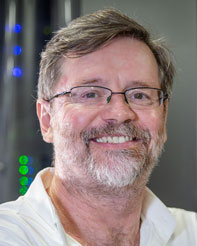

 Skip to navigation
Skip to navigation
Site Primary Navigation:
- About SDSC
- Services
- Support
- Research & Development
- Education & Training
- News & Events
Search The Site:

Published October 2024

Dear SDSC Collaborators, Partners and All Friends:
SDSC’s preparations for the annual, national Supercomputing Conference (SC24) are well underway, and we are looking forward to joining many of you in Atlanta next month. Our theme for this year’s conference – Innovating to Impact Science, Technology, Education and Society for a Better World – comes to life in many of the articles featured below.
We are proud of our work that enables groundbreaking scientific discoveries. For example, the announcement of University of Washington’s David Baker, who recently was awarded the Nobel Prize in Chemistry. Baker’s connection to SDSC dates back to 2006, when his computational code – Rosetta Code – was used to predict the 3D structure of a small protein solely based on its amino acid sequence. Baker and the SDSC team achieved the largest-ever protein structure prediction and completed the simulation in less than three hours, a huge feat at the time.
SDSC bridges science and education, and just one example of this is our participation in OpenTopography – a science gateway that advances understanding of the Earth’s surface, vegetation and built environment. The U.S. National Science Foundation (NSF) recently renewed its funding with $4.18 million over four years for the next generation of the project, which is jointly funded by the Geoinformatics program in NSF’s Division of Earth Sciences and the National Discovery Cloud for Climate (NDC-C) initiative of NSF. NDC-C focuses on innovative cyberinfrastructure development including support for other NSF initiatives like the National Artificial Intelligence Research Resource (NAIRR).
Another example is the upcoming CORE Summit. SDSC will be hosting the 2024 CORE Summit, Oct. 23 and 24, which will focus on leveraging artificial intelligence for sustainable food systems. You can read more about the summit, as well as OpenTopography, under News Highlights below.
In the education space, SDSC is co-leading efforts with CENIC to expand AI education infrastructure throughout the state of California. Specifically, SDSC and CENIC have developed an AI education infrastructure called CENIC AI Resource (CENIC AIR) for K-12 education, public libraries, community colleges, the California State University (CSU) and the University of California (UC) campus systems. The effort has already impacted nine CSU and community college campuses. Please read more about the latest with this effort below.
When it comes to translating research into actionable knowledge and applying data to address societal challenges, I encourage you to read about the Wildfire Science & Technology Commons in the News Highlights section. The Wildfire Commons aims to accelerate cross-domain and cross-sector collaborations that advance solutions for a wildfire-resilient future.
These are just a few highlights of our recent accomplishments. We will share more about the outcomes of SC24, as well as our plans for the months ahead as part of the new School of Computing, Information and Data Sciences, in upcoming editions of Innovators.
Thank you for your interest and support. See you in Atlanta!
Best wishes,
Frank Würthwein
SDSC Director